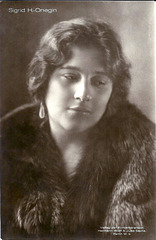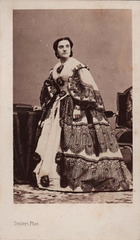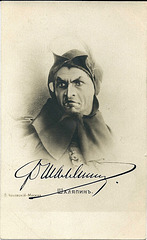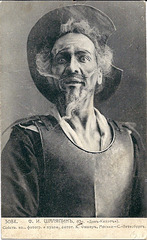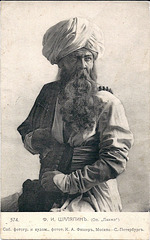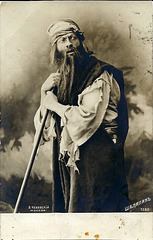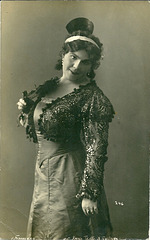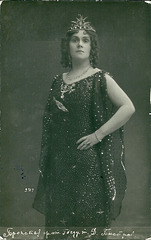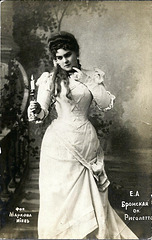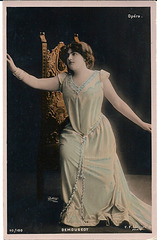OperaMania's photos
Sigrid Onegin
| |
|
Sigrid Onégin
(Elizabeth Elfriede Sigrid Hoffmann)
1889 – 1943
Swedish contralto
She studied in Frankfurt, Munich, and Milan, and also took lessons from Lilli Lehmann and Margarethe Siems She made her professional debut in concert under her maiden name, Lilly Hoffmann in 1911. After her marriage to Russian pianist and composer Eugene Onégin (1870–1919), she sang briefly as Lilly Hoffmann-Onégin. Debut as Carmen in “Carmen” by Bizet at Stuttgart in October 1912, She created Dryad in “Ariadne auf Naxos “ By Richard Strauss atd the Stuttgart Opera in 1912 .She went to the Munich Opera in 1919.
In the 1920s, she spent two seasons at the Metropolitan Opera and one at Covent Garden, singing Amneris (Aida) as well as a variety of Wagnerian roles. In the 1930s, she sang at Salzburg and Bayreuth Festival, but she was most widely sought after for her concert performances..Her last concert appearance came in the United States in 1938. Roles included. Orfeo in “ Orfeo ed Euridice” by Gluck , Eboli in “Don Carlos” by Verdi , Fidès in “Le prophète” by Meyerbeer , Erda in both “Das Rheingold “ & “Siegfried” by Wagner , Lady Macbeth in “Macbeth” by Verdi , Fricka in both “Das Rheingold & Die Walküre” by Wagner ,Waltraute in “Die Walküre & Götterdämmerung” by Wagner ,Brangäne in “Tristan und Isolde” by Wagner , Amneris in “Aida” by Verdi and Orsini in “Lucrezia Borgia” by Donizetti
Nina Pack
| |
|
as Carmen in "Carmen" by Bizet
Nina Pack
(Annette Marie Ballay)
1869-????
French Soprano
Studied at the Paris Conservatory and engaged by the Opera Comique and made her debut as a soul in “la Tempete” by Duvernoy in 1889.In 1890 she created Fathma in “Zaire” by de la Nux at the Palais Garnier in Paris. She also sang in Geneva.Roles included Sieglinde in “Die Walkure” by Wagner m Valentine in “Les Huguenots” by Meyerbeer , Carmen in “Carmen” by Bizet , Scazzone in “Ascanio” by Saint-Seans , Hilde in “Sigurd” by Reyer , Santuzza in “Cavalleria Rusticana” by Mascagni , Madeline in “Rigoletto” by Verdi , Selika in “L’Africaine” by Meyerbeer and Berthe in “Le Prophete by Meyerbeer.
Adelaide Borghi-Mamo by Disderi
| |
|
|
ADELAIDE BORGHI-MAMO
(9 August 1826 – 29 September 1901) Italian Mezzo-soprano
studied singing in Milan with Francesca Festa before making her professional opera debut in 1843 at the opera house in Urbino as Bianca in Saverio Mercadante's Il giuramento. The following year she joined the roster of singers at the Teatro Vittorio Emanuele in Messina.In 1851 she portrayed the role of Morna in the world premiere of Giovanni Pacini's Malvina di Scozia at the Teatro di San Carlo. She returned there in 1853 to create the role of Olimpia in the premiere of Saverio Mercadante's Statira and the role of Odetta in the premiere of Pacini's Romilda di Provenza. She was also heard at that house that year as Azucena in Giuseppe Verdi's Il trovatore and in the title role in Gaetano Braga's Alina. On 23 August 1853 she performed in the world premiere of Lauro Rossi's L'alchimista at the Teatro del Fondo in Naples. She was also heard in Vienna in 1853. In 1854 she sang in another premiere at the Teatro di San Carlo: the role of Tremacoldo in Errico Petrella's Marco Visconti.
Feodor Chaliapin Autographed
| |
|
as Mephistoles in "Faust" by Gounod
FEODOR IVANOVICH CHALIAPIN
(February 13 ,1873 – April 12, 1938)
Russian Bass
Largely self-taught, he began his career at Tbilisi and the Imperial Opera, St. Petersburg in 1894. He was then invited to sing at the Mamontov Private Opera (1896–1899); his first role there was as Mephistopheles in Gounod's Faust,
At Mamontov he also met Sergei Rachmaninoff, who was serving as an assistant conductor there and with whom he remained friends for life. Rachmaninoff taught him much about musicianship, including how to analyze a music score, and insisted that Chaliapin learn not only his own roles but also all the other roles in the operas in which he was slated to appear. With Rachmaninoff he learned the title role of Mussorgsky's Boris Godunov, which became his signature character , On the strength of his Mamontov appearances, the Bolshoi Theatre in Moscow engaged Chaliapin, where he appeared regularly from 1899 until 1914. During the First World War, Chaliapin also appeared regularly at the Zimin Private Opera in Moscow. In addition, from 1901, Chaliapin began touring in the West, making a sensational debut at La Scala that year as the devil in a production of Boito's Mefistofele, under the baton of one of the 20th century's most dynamic opera conductors, Arturo Toscanini
Chaliapin's last stage performance took place at the Monte Carlo Opera in 1937, as Boris. He died the following year of leukemia, aged 65, in Paris, where he was interred
Feodor Chaliapin
| |
|
as Don Quichotte in "Don Quichotte" by Massenet ,CREATOR , 19th Fenruary 1910 at Opera Monte Carlo
FEODOR IVANOVICH CHALIAPIN
(February 13 ,1873 – April 12, 1938)
Russian Bass
Largely self-taught, he began his career at Tbilisi and the Imperial Opera, St. Petersburg in 1894. He was then invited to sing at the Mamontov Private Opera (1896–1899); his first role there was as Mephistopheles in Gounod's Faust,
At Mamontov he also met Sergei Rachmaninoff, who was serving as an assistant conductor there and with whom he remained friends for life. Rachmaninoff taught him much about musicianship, including how to analyze a music score, and insisted that Chaliapin learn not only his own roles but also all the other roles in the operas in which he was slated to appear. With Rachmaninoff he learned the title role of Mussorgsky's Boris Godunov, which became his signature character , On the strength of his Mamontov appearances, the Bolshoi Theatre in Moscow engaged Chaliapin, where he appeared regularly from 1899 until 1914. During the First World War, Chaliapin also appeared regularly at the Zimin Private Opera in Moscow. In addition, from 1901, Chaliapin began touring in the West, making a sensational debut at La Scala that year as the devil in a production of Boito's Mefistofele, under the baton of one of the 20th century's most dynamic opera conductors, Arturo Toscanini
Chaliapin's last stage performance took place at the Monte Carlo Opera in 1937, as Boris. He died the following year of leukemia, aged 65, in Paris, where he was interred
Feodor Chaliapin
| |
|
as Ivan Sussanin 'A Life for a Tsar" by Glinka
FEODOR IVANOVICH CHALIAPIN
(February 13 ,1873 – April 12, 1938)
Russian Bass
Largely self-taught, he began his career at Tbilisi and the Imperial Opera, St. Petersburg in 1894. He was then invited to sing at the Mamontov Private Opera (1896–1899); his first role there was as Mephistopheles in Gounod's Faust,
At Mamontov he also met Sergei Rachmaninoff, who was serving as an assistant conductor there and with whom he remained friends for life. Rachmaninoff taught him much about musicianship, including how to analyze a music score, and insisted that Chaliapin learn not only his own roles but also all the other roles in the operas in which he was slated to appear. With Rachmaninoff he learned the title role of Mussorgsky's Boris Godunov, which became his signature character , On the strength of his Mamontov appearances, the Bolshoi Theatre in Moscow engaged Chaliapin, where he appeared regularly from 1899 until 1914. During the First World War, Chaliapin also appeared regularly at the Zimin Private Opera in Moscow. In addition, from 1901, Chaliapin began touring in the West, making a sensational debut at La Scala that year as the devil in a production of Boito's Mefistofele, under the baton of one of the 20th century's most dynamic opera conductors, Arturo Toscanini
Chaliapin's last stage performance took place at the Monte Carlo Opera in 1937, as Boris. He died the following year of leukemia, aged 65, in Paris, where he was interred
Feodor Chaliapin
| |
|
as Nilakantha in "Lakme" Delibes
FEODOR IVANOVICH CHALIAPIN
(February 13 ,1873 – April 12, 1938)
Russian Bass
Largely self-taught, he began his career at Tbilisi and the Imperial Opera, St. Petersburg in 1894. He was then invited to sing at the Mamontov Private Opera (1896–1899); his first role there was as Mephistopheles in Gounod's Faust,
At Mamontov he also met Sergei Rachmaninoff, who was serving as an assistant conductor there and with whom he remained friends for life. Rachmaninoff taught him much about musicianship, including how to analyze a music score, and insisted that Chaliapin learn not only his own roles but also all the other roles in the operas in which he was slated to appear. With Rachmaninoff he learned the title role of Mussorgsky's Boris Godunov, which became his signature character , On the strength of his Mamontov appearances, the Bolshoi Theatre in Moscow engaged Chaliapin, where he appeared regularly from 1899 until 1914. During the First World War, Chaliapin also appeared regularly at the Zimin Private Opera in Moscow. In addition, from 1901, Chaliapin began touring in the West, making a sensational debut at La Scala that year as the devil in a production of Boito's Mefistofele, under the baton of one of the 20th century's most dynamic opera conductors, Arturo Toscanini
Chaliapin's last stage performance took place at the Monte Carlo Opera in 1937, as Boris. He died the following year of leukemia, aged 65, in Paris, where he was interred
Feodor Chaliapin
| |
|
as Nilakantha in "Lakme" Delibes
FEODOR IVANOVICH CHALIAPIN
(February 13 ,1873 – April 12, 1938)
Russian Bass
Largely self-taught, he began his career at Tbilisi and the Imperial Opera, St. Petersburg in 1894. He was then invited to sing at the Mamontov Private Opera (1896–1899); his first role there was as Mephistopheles in Gounod's Faust,
At Mamontov he also met Sergei Rachmaninoff, who was serving as an assistant conductor there and with whom he remained friends for life. Rachmaninoff taught him much about musicianship, including how to analyze a music score, and insisted that Chaliapin learn not only his own roles but also all the other roles in the operas in which he was slated to appear. With Rachmaninoff he learned the title role of Mussorgsky's Boris Godunov, which became his signature character , On the strength of his Mamontov appearances, the Bolshoi Theatre in Moscow engaged Chaliapin, where he appeared regularly from 1899 until 1914. During the First World War, Chaliapin also appeared regularly at the Zimin Private Opera in Moscow. In addition, from 1901, Chaliapin began touring in the West, making a sensational debut at La Scala that year as the devil in a production of Boito's Mefistofele, under the baton of one of the 20th century's most dynamic opera conductors, Arturo Toscanini
Chaliapin's last stage performance took place at the Monte Carlo Opera in 1937, as Boris. He died the following year of leukemia, aged 65, in Paris, where he was interred
Mary Boyer
| |
|
as Carmen in "Carmen" by Bizet
Mary Boyer
1869-1951
French Soprano
A minor singer at Paris & the providences , who started her career in minor roles at the Opera Comique in the 1880's and appeared later in opera at the Folies-dramatiques and the Gaite (1900 & 1907).She also sang in Moscow , Warsaw & Palermo .Spent much of her career in Bordeux her home city .
Mary Boyer
| |
|
Mary Boyer
1869-1951
French Soprano
A minor singer at Paris & the providences , who started her career in minor roles at the Opera Comique in the 1880's and appeared later in opera at the Folies-dramatiques and the Gaite (1900 & 1907).She also sang in Moscow , Warsaw & Palermo .Spent much of her career in Bordeux her home city
Eugenia Bronskaya
| |
|
Eugenia Bronskaya
1882-1953
Russian Soprano
She studied first with her mother in Russia and later with Teresa Arkel in Milan. After her début at Tbilisi in 1901 she sang for three years in Kiev and from 1905 to 1907 in Moscow. Returning to Italy she performed Tatyana in the Venice première of “Yevgeny Onegin” By Tchaikovsky . She toured widely including France , Italy, when she joined the Boston Opera Company in 1909, making her début there as Micaëla in “Carmen” by Bizet. Other roles included Marguerite de Valois in “Les Huguenots” Meyerbeer ,Gilda in “Rigoletto” Verdi , Lucia in “ Lucia di Lammermoor” Donizetti , and on her return to Russia in 1911 was engaged at the Mariinsky and Bolshoi theatres. From 1923 to 1950 she taught at the Leningrad Conservatory.
Eugenia Bronskaya
| |
|
Eugenia Bronskaya
1882-1953
Russian Soprano
She studied first with her mother in Russia and later with Teresa Arkel in Milan. After her début at Tbilisi in 1901 she sang for three years in Kiev and from 1905 to 1907 in Moscow. Returning to Italy she performed Tatyana in the Venice première of “Yevgeny Onegin” By Tchaikovsky . She toured widely including France , Italy, when she joined the Boston Opera Company in 1909, making her début there as Micaëla in “Carmen” by Bizet. Other roles included Marguerite de Valois in “Les Huguenots” Meyerbeer ,Gilda in “Rigoletto” Verdi , Lucia in “ Lucia di Lammermoor” Donizetti , and on her return to Russia in 1911 was engaged at the Mariinsky and Bolshoi theatres. From 1923 to 1950 she taught at the Leningrad Conservatory.
Eugenia Bronskaya
| |
|
as Gilda in "Rigoletto" by Verdi
Eugenia Bronskaya
1882-1953
Russian Soprano
She studied first with her mother in Russia and later with Teresa Arkel in Milan. After her début at Tbilisi in 1901 she sang for three years in Kiev and from 1905 to 1907 in Moscow. Returning to Italy she performed Tatyana in the Venice première of “Yevgeny Onegin” By Tchaikovsky . She toured widely including France , Italy, when she joined the Boston Opera Company in 1909, making her début there as Micaëla in “Carmen” by Bizet. Other roles included Marguerite de Valois in “Les Huguenots” Meyerbeer ,Gilda in “Rigoletto” Verdi , Lucia in “ Lucia di Lammermoor” Donizetti , and on her return to Russia in 1911 was engaged at the Mariinsky and Bolshoi theatres. From 1923 to 1950 she taught at the Leningrad Conservatory.
Eugenia Bronskaya
| |
|
as Philine in "Mignon" by Thomas
Eugenia Bronskaya
1882-1953
Russian Soprano
She studied first with her mother in Russia and later with Teresa Arkel in Milan. After her début at Tbilisi in 1901 she sang for three years in Kiev and from 1905 to 1907 in Moscow. Returning to Italy she performed Tatyana in the Venice première of “Yevgeny Onegin” By Tchaikovsky . She toured widely including France , Italy, when she joined the Boston Opera Company in 1909, making her début there as Micaëla in “Carmen” by Bizet. Other roles included Marguerite de Valois in “Les Huguenots” Meyerbeer ,Gilda in “Rigoletto” Verdi , Lucia in “ Lucia di Lammermoor” Donizetti , and on her return to Russia in 1911 was engaged at the Mariinsky and Bolshoi theatres. From 1923 to 1950 she taught at the Leningrad Conservatory.
Marcelle Demougeot
| |
|
Marcelle Demougeot
(Jeanne Marguerite Marcelle Decorne)
1876-1931
French Soprano
Studied in Dijon with Charles Laurent and at the Paris Conservatory with Hettich.Debut 1902 at Palais Garnier Paris as Donna Elvira in “ Don Giovanni” by Mozart . In 1904 she sang in the premiere of “Le fils de l’étoile” by Camille Erlanger, and 1906 as Cypris in “Ariane”, by Massenet .1907-09 seasons she sang at the provincial theaters and later at Nice, Bordeaux, Lyon and Vichy. In 1921 she sang at the Palais Garnier Paris as Brunnhilde in ”Die Walkure’’. In 1930 she sang Brünnhilde in the Ring cycle. in Strasbourg. She was considered the most important French Wagnerian soprano of her generation and she also sang Fricka in “Rheingold” by Wagner. Kundry in “Parsifal” by Wagner .She also sang roles such as Aida in “Aida” by Verdi , Valentine in “Les Huguenots” by Meyerbeer, Mathilde in “William Tell” by Rossini, Cyria in “Ariane” by Massenet and Marguerite in “La Damnation de Faust” by Berlioz. Dejanire “Déjanire” by Saint-Saens .She was also a noted concert singer .She retired in 1925 and taught singing
Marcelle Demougeot
| |
|
as Brunhilde "Die Gotterdammerung" by Wagner
Marcelle Demougeot
(Jeanne Marguerite Marcelle Decorne)
1876-1931
French Soprano
Studied in Dijon with Charles Laurent and at the Paris Conservatory with Hettich.Debut 1902 at Palais Garnier Paris as Donna Elvira in “ Don Giovanni” by Mozart . In 1904 she sang in the premiere of “Le fils de l’étoile” by Camille Erlanger, and 1906 as Cypris in “Ariane”, by Massenet .1907-09 seasons she sang at the provincial theaters and later at Nice, Bordeaux, Lyon and Vichy. In 1921 she sang at the Palais Garnier Paris as Brunnhilde in ”Die Walkure’’. In 1930 she sang Brünnhilde in the Ring cycle. in Strasbourg. She was considered the most important French Wagnerian soprano of her generation and she also sang Fricka in “Rheingold” by Wagner. Kundry in “Parsifal” by Wagner .She also sang roles such as Aida in “Aida” by Verdi , Valentine in “Les Huguenots” by Meyerbeer, Mathilde in “William Tell” by Rossini, Cyria in “Ariane” by Massenet and Marguerite in “La Damnation de Faust” by Berlioz. Dejanire “Déjanire” by Saint-Saens .She was also a noted concert singer .She retired in 1925 and taught singing
Marcelle Demougeot
| |
|
as Carmen in "Carmen" by Bizet
Marcelle Demougeot
(Jeanne Marguerite Marcelle Decorne)
1876-1931
French Soprano
Studied in Dijon with Charles Laurent and at the Paris Conservatory with Hettich.Debut 1902 at Palais Garnier Paris as Donna Elvira in “ Don Giovanni” by Mozart . In 1904 she sang in the premiere of “Le fils de l’étoile” by Camille Erlanger, and 1906 as Cypris in “Ariane”, by Massenet .1907-09 seasons she sang at the provincial theaters and later at Nice, Bordeaux, Lyon and Vichy. In 1921 she sang at the Palais Garnier Paris as Brunnhilde in ”Die Walkure’’. In 1930 she sang Brünnhilde in the Ring cycle. in Strasbourg. She was considered the most important French Wagnerian soprano of her generation and she also sang Fricka in “Rheingold” by Wagner. Kundry in “Parsifal” by Wagner .She also sang roles such as Aida in “Aida” by Verdi , Valentine in “Les Huguenots” by Meyerbeer, Mathilde in “William Tell” by Rossini, Cyria in “Ariane” by Massenet and Marguerite in “La Damnation de Faust” by Berlioz. Dejanire “Déjanire” by Saint-Saens .She was also a noted concert singer .She retired in 1925 and taught singing
Marcelle Demougeot
| |
|
as Elsa in "Lohengrin" by Wagner
Marcelle Demougeot
(Jeanne Marguerite Marcelle Decorne)
1876-1931
French Soprano
Studied in Dijon with Charles Laurent and at the Paris Conservatory with Hettich.Debut 1902 at Palais Garnier Paris as Donna Elvira in “ Don Giovanni” by Mozart . In 1904 she sang in the premiere of “Le fils de l’étoile” by Camille Erlanger, and 1906 as Cypris in “Ariane”, by Massenet .1907-09 seasons she sang at the provincial theaters and later at Nice, Bordeaux, Lyon and Vichy. In 1921 she sang at the Palais Garnier Paris as Brunnhilde in ”Die Walkure’’. In 1930 she sang Brünnhilde in the Ring cycle. in Strasbourg. She was considered the most important French Wagnerian soprano of her generation and she also sang Fricka in “Rheingold” by Wagner. Kundry in “Parsifal” by Wagner .She also sang roles such as Aida in “Aida” by Verdi , Valentine in “Les Huguenots” by Meyerbeer, Mathilde in “William Tell” by Rossini, Cyria in “Ariane” by Massenet and Marguerite in “La Damnation de Faust” by Berlioz. Dejanire “Déjanire” by Saint-Saens .She was also a noted concert singer .She retired in 1925 and taught singing

